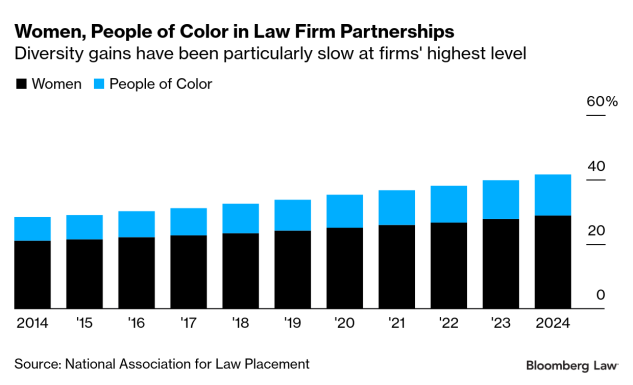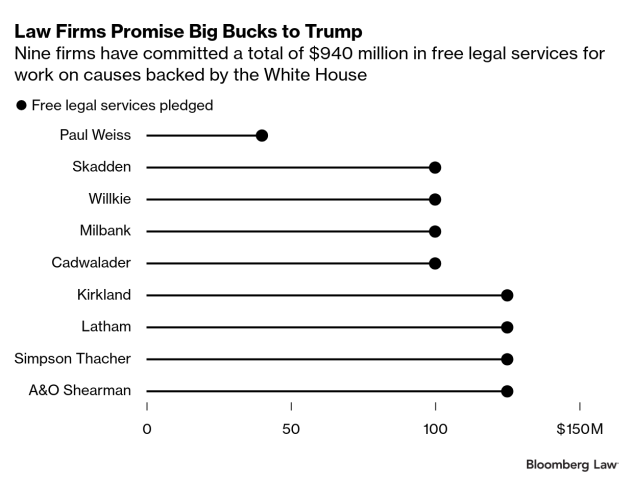- Firms focus on work that can meet legal tests
- Leaders step quietly after Trump cracks down
Law firms that are trying to push forward with diversity efforts are focusing on initiatives they see as clearly legal to avoid attracting the ire of the Trump administration.
The programs include affinity groups open to all, mentoring for young lawyers, and broadening candidate pools for junior and senior talent in ways that don’t explicitly focus on race. The firms view the initiatives as meeting legal tests posed by a 2023 Supreme Court decision banning race-based college admissions.
“There’s still a tremendous amount of lawful DEI work that can still happen,” said David Glasgow, a lawyer who counsels firms on diversity. The Supreme Court “can’t reasonably or legally object to initiatives that are actually about removing bias from workplace systems.”
The efforts to diversify ranks aim to dodge legal attacks from President Donald Trump and his team, who have referred to diversity, equity and inclusion initiatives as “radical,” a “tyranny,” and “illegal and immoral.”
The US Equal Employment Opportunity Commission in March sent letters to 20 top law firms to investigate their DEI practices, making good on a directive from Trump. Andrea Lucas, the agency’s acting leader who has made targeting DEI a top priority, said she’s “prepared to root out discrimination anywhere it may rear its head.”
The administration’s mission is emboldened by the Supreme Court decision striking down race-based admissions at Harvard University. Conservative activist Edward Blum pounced on the ruling to sue three law firms and got them to change their criteria for diversity fellowships.
Some law firms have opted to cease or scale back their DEI programs amid scrutiny and a series of Trump executive orders aimed at the president’s perceived enemies. Nine firms that struck deals with Trump to avoid punitive orders agreed to abandon “illegal DEI.”
DLA Piper scrapped its affinity groups altogether, while Skadden, Arps, Slate, Meagher & Flom discontinued affinity group events for the rest of the year. Reed Smith, which along with Skadden was hit with an EEOC inquiry, said it would “retire” DEI branding for its hiring and promotion initiatives.
Many firms moving forward are doing so quietly after previously touting their devotion to DEI causes. They are de-emphasizing diversity efforts on their websites, changing the titles of people in charge of the programs, and conducting audits to ensure firm initiatives can meet legal tests.
Representatives at several firms declined to speak on the record about their diversity programs.
“It’s a very unpredictable situation,” said Nikia Gray, executive director of the National Association for Law Placement, which works to diversify law firm ranks. “It behooves all of us to think through all of the different contingencies.”
Meeting Legal Tests
Glasgow said law firms that want to promote diversity can focus on performance evaluations, promotion processes, and anti-biasing recruitment. They can also have affinity groups for Black, Asian, and LGBTQ+ attorneys, as well as former military veterans and others—though meetings must be open to all, he said.
One leader at a large firm who requested anonymity to discuss diversity is working with practice group chairs to ensure inclusivity by checking biases that pop up during decision-making moments. They often sit in on meetings to offer an inclusive perspective in hiring and promotion discussions.
It’s unclear if firms that made deals with Trump—including Kirkland & Ellis, Latham & Watkins, and Skadden—will continue previous diversity efforts. The firms pledged $940 million in free legal services and agreed to certify to the White House every six months that they’re complying with federal anti-discrimination laws.
Some firms are seeking to widen recruiting pools: Latham last year attended events such as the Bay Area Diversity Career Fair and the Lavender Law Career Fair. Several see mentorship programs as a key tool. Skadden offered annual implicit bias training, mentorship, and coaching opportunities for lawyers from underrepresented backgrounds last year, according to a diversity survey.
Kirkland incentivized diversity work by making it eligible for billable credit, a prized standard Big Law attorneys must rack up throughout the year, in order to collect their yearly bonuses that can be as much as $115,000.
Latham, Skadden, and Kirkland did not respond to requests for comment.
‘Strict Scrutiny’
Still, the Trump administration and its allies voice skepticism about diversity efforts.
Justice Department lawyer Richard Lawson said in a hearing last month that firms’ DEI work unlawfully stereotypes people. Using race and gender demographics as success markers for diversity progress is problematic, he said.
Initiatives such as the Mansfield Rule, which encourage law firms to include at least 30% of “qualified underrepresented talent out of the unlimited number of people considered” for promotions and hiring, are unconstitutional in the government’s view, Lawson said.
Blum, the affirmative action foe, said in an email May 6 in response to questions from Bloomberg Law that even affinity groups open to all may violate civil rights law if they operate in effect to limit or exclude people based on sex, race, or ethnicity.
“The use of race and ethnicity in our public policies must comport with what the courts have designated as ‘strict scrutiny’ which, in virtually all instances, is extremely rare,” Blum said.
That’s a hurdle for law firms that have seen incremental success diversifying their ranks.
People of color made up less than 13% of law firm partners in 2024, according to NALP, while women made up more than 50% of law firm associates. Both tallies were the highest since NALP began tracking the data 32 years ago.
“The legal profession is one of the least diverse,” said Dru Levasseur, who runs the Trans Legal Professionals Networking Program. “The decades and decades of work that have gone into trying to make a difference in that don’t need to be washed away right now.”
Many firms moving ahead with diversity initiatives are still weighing how much of them they will make public, NALP’s Gray said.
“I haven’t yet seen where the industry is going to settle,” she said. “There’s a lot of variability right now happening.”
To contact the reporter on this story:
To contact the editors responsible for this story:
Learn more about Bloomberg Law or Log In to keep reading:
See Breaking News in Context
Bloomberg Law provides trusted coverage of current events enhanced with legal analysis.
Already a subscriber?
Log in to keep reading or access research tools and resources.


